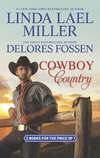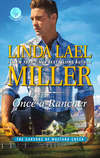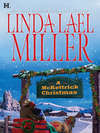Buch lesen: «McKettricks of Texas: Garrett»

Praise for the novels of
LINDA LAEL
MILLER
‘Linda Lael Miller creates vibrant characters and stories
I defy you to forget.’
Debbie Macomber
‘As hot as the noontime desert.’
Publishers Weekly on The Rustler
‘This story creates lasting memories of soul-searing redemption and the belief in goodness and hope.’
RT Book Reviews on The Rustler
‘Miller’s prose is smart, and her tough Eastwoodian cowboy cuts a sharp, unexpectedly funny figure in a classroom full of rambunctious frontier kids.’
Publishers Weekly on The Man from Stone Creek
‘[Miller] paints a brilliant portrait of the good, the bad and the ugly, the lost and the lonely, and the power of love to bring light into the darkest of souls. This is western romance at its finest.’
RT Book Reviews on The Man from Stone Creek
‘Sweet, homespun, and touched with angelic Christmas magic, this holiday romance reprises characters from Miller’s popular McKettrick series and is a perfect stocking-stuffer for her fans.’
Library Journal on A McKettrick Christmas
‘An engrossing, contemporary western romance …’
Publishers Weekly on McKettrick’s Pride (starred review)
Dear Reader,
Welcome to the second of three books starring a brand-new group of modern-day McKettrick men. Readers who have embraced the irrepressible, larger-than-life McKettrick clan as their own won’t want to miss the stories of Tate, Garrett and Austin—three Texas-bred brothers who meet their matches in the Remington sisters. Political troubleshooter Garrett McKettrick and drama teacher Julie Remington are as different as two people can be … but opposites have a way of attracting in Blue River, Texas, and when fate brings their families together, the sparks begin to fly.
I also wanted to write today to tell you about a special group of people with whom I’ve become involved in the past couple years. It is the Humane Society of the United States (HSUS), specifically their Pets for Life programme.
The Pets for Life programme is one of the best ways to help your local shelter: that is, to help keep animals out of shelters in the first place. Something as basic as keeping a collar and tag on your pet all the time, so if he gets out and gets lost, he can be returned home. Be a responsible pet owner. Spay or neuter your pet. And don’t give up when things don’t go perfectly. If your dog digs in the yard, or your cat scratches the furniture, know that these are problems that can be addressed. You can find all the information about these—and many other common problems—at www.petsforlife.org.
This campaign is focused on keeping pets and their people together for a lifetime.
As many of you know, my own household includes two dogs, two cats and six horses, so this is a cause that is near and dear to my heart. I hope you’ll get involved along with me.
With love,

McKettricks of Texas:
Garrett
Linda Lael Miller

Also available from
Linda Lael Miller and Mills & Boon
McKettricks of Texas: Tate (in the Untameable collection with Diana Palmer)
Don’t miss the further adventures of
THE McKETTRICKS OF TEXAS
McKettricks of Texas: Austin August 2012
For Jeremy Hargis, with love.
CHAPTER ONE
GARRETT MCKETTRICK WANTED A HORSE under him—a fleet cow-pony like the ones bred to work the herds on the Silver Spur Ranch. But for now, anyway, the Porsche would have to do.
Because of the hour—it was a little after 3:00 a.m.—Garrett had that particular stretch of Texas highway all to himself. The moon and stars cast silvery shadows through the open sunroof and shimmered on the rolled-up sleeves of his white dress shirt, while a country oldie, with lots of twang, pounded from the sound system. Everything in him—from the nuclei of his cells outward—vibrated to the beat.
He’d left the tuxedo jacket, the cummerbund, the tie, the fancy cuff links, back in Austin—right along with one or two of his most cherished illusions.
The party was definitely over—for him, anyhow.
He should have seen it coming—or at least listened to people who did see it coming, specifically his brothers, Tate and Austin. They’d done their best to warn him.
Senator Morgan Cox, they’d said, in so many words and in their different ways, wasn’t what he seemed.
Against his will, Garrett’s mind looped back a few hours, and even as he sped along that straight, dark ribbon of road, another part of him relived the shock in excruciating detail.
Cox had always presented himself as a family man, in public and private. A corner of each of his hand-carved antique desks in both the Austin and Washington offices supported a small forest of framed photos—himself and Nan on their wedding day, himself and Nan and the first crop of kids, himself and Nan and more kids, some of whom were adopted and had special needs. Altogether, there were nine Cox offspring.
The dogs—several generations of golden retrievers, all rescued, of course—were pictured as well.
That night, with no warning at all, Garrett’s longtime boss and mentor had arrived at an important fundraiser, held in a glittering hotel ballroom, but not with Nan on his arm—elegant, articulate, wholesome Nan, with her own pedigree as a former Texas governor’s daughter. Oh, no. This powerful U.S. senator, a war hero, a man with what many people considered a straight shot at the White House, had instead escorted a classic bimbo, later identified as a twenty-two-year-old pole dancer who went by the unlikely name of Mandy Chante.
Before God, his amazed supporters, the press and, worst of all, Nan, the senator proceeded to announce that he and Mandy were soul mates. Kindred spirits. They’d been lovers in a dozen other lifetimes, he rhapsodized. In short, Cox explained from the microphone on the dais—his lover hovering earnestly beside him in a long, form-fitting dress rippling with ice-blue sequins, which gave her the look of a mermaid with feet—he hoped everyone would understand.
He had to follow his heart.
If only the senator’s heart were the organ he was following, Garrett lamented silently.
One of those freeze-frame silences followed, vast and uncomfortable, turning the whole assembly into a garden of stone statues while several hundred people tried to process what they’d just heard Cox say.
Who was this guy, they were probably asking themselves, and what had he done with the Morgan Cox they all knew? Where, Garrett himself wondered, was the man who had given that stirring eulogy at the double funeral after Jim and Sally McKettrick, his folks, were killed a decade before?
The mass paralysis following Morgan’s proclamation lasted only a few seconds, and Garrett was quick to shake it off. Automatically, he scanned the room for Nan Cox—his late mother’s college roommate—and found her standing near the grand piano, alone.
Most likely, Nan, a veteran political wife, had been in transit between one conversational cluster and another when her husband dropped the bombshell. She was still smiling, in fact, and the effect was eerie, even surreal.
Like the true lady she was, however, Nan immediately drew herself up, made her way through friends and strangers, enemies and intimate confidants to step up to Garrett’s side, link her arm with his and whisper, “Get him out of here, Garrett. Get Morgan out of here now, before this gets any worse.”
Garrett glanced at the senator, who ignored his wife of more than three decades, the mother of his children, the flesh-and-blood, hurting woman he had just humiliated in a very public way, to gaze lovingly into the upturned face of his mistress. The mermaid’s plump, glistening lower lip jutted out in a pout.
Cox patted the young woman’s hand reassuringly then, acting as though she, not Nan, might have been traumatized.
The cameras came out, amateur and professional; a blinding dazzle surrounded the happy couple. Within a couple of minutes, some of that attention would surely shift to Nan.
“I’m getting you away first,” Garrett told Nan, using his right arm to lock her against his side and starting for the nearest way out. As the senator’s aide, Garrett had a lot of experience at running interference, and he always scoped out every exit in every venue in advance, just in case. Even the familiar ones, like that hotel, which happened to be the senator’s favorite.
Nan didn’t argue—not then, anyway. She kept up with Garrett, offered no protest when he hustled her through a corridor crowded with carts and wait-staff, then into a service elevator.
Garrett flipped open his cell phone and speed-dialed a number as they descended, Nan leaning against the elevator wall now, looking down at her feet, stricken to silence. Her beautifully coiffed silver hair gleamed in the fluorescent light.
The senator’s personal driver, Troy, answered on the first ring, his tone cheerful. “Garrett? What’s up, man?”
“Bring the car around to the back of the hotel,” Garrett said. “And hurry.”
Nan looked up, met Garrett’s gaze. She was pale, and her eyes looked haunted, but the smile resting on her mouth was real, if slight. “You’re probably scaring poor Troy to death,” she scolded, putting a hand out for the cell phone.
Garrett handed it over just as they reached the ground floor, and Nan spoke efficiently into the mouthpiece.
“Troy? This is Mrs. Cox. Just so you know, there’s no fire, and nobody’s been shot or had a heart attack. But it probably is a good idea for me to leave the building, so be a dear and pick me up behind the hotel.” A pause. “Oh, you are? Perfect. I’ll explain in the car. Meanwhile, here’s Garrett again.”
With that, she handed the phone back to Garrett.
When he put it to his ear, he heard Troy suck in a nervous breath. “I’m outside the kitchen door, buddy,” he said. “I’ll take Mrs. Cox home and come straight back, in case you need some help.”
“Excellent idea,” Garrett said, as the elevator doors opened into the institution-sized kitchen.
The senator’s wife smiled and nodded to a bevy of surprised kitchen workers as she and Garrett headed for the outside door.
True to his word, Troy was waiting in back, the rear passenger-side door of the sedan already open for Mrs. Cox.
He and Garrett exchanged glances as Nan slipped into the back seat, but neither of them spoke.
Troy closed her door, but she immediately lowered the window.
“My husband needs your help,” she told Garrett quietly but firmly. “This is no time to judge him—there will be enough of that in the media.”
“Yes, ma’am,” Garrett answered.
Troy climbed behind the wheel again, and Garrett was already heading back through the kitchen door when they pulled away.
He strode to the service elevator, pushed the button and waited until it lumbered down from some upper floor.
When the doors slid open, there were the senator and the bimbo.
The senator blinked when he saw Garrett. He looked older somehow, and he was wearing his glasses. “There you are,” he said. “I was wondering where you’d gotten to, young McKettrick. Nan, too. Have you seen my wife?”
Nan’s remark, spoken only a minute or two before, echoed in Garrett’s mind.
My husband needs your help.
And juxtaposed to that, the senator’s oddly solicitous, Have you seen my wife?
Garrett made an attempt at a smile, but it felt like a grimace instead. He narrowed his eyes slightly, shot a glance at the mermaid and then faced the senator again. “Mrs. Cox is on her way home, sir,” he said.
“I imagine she was upset,” Cox replied, looking both regretful and detached.
“She’s a lady, sir,” Garrett answered evenly. “And she’s behaving like one.”
Cox gave a fond chuckle and nodded. “First, last and always, Nan is a lady,” he agreed.
Beside him, the mermaid seethed, clinging a little more tightly to the senator’s arm and glaring at Garrett.
Garrett glared right back. This woman, he decided, was no mermaid, and no lady, either. She was a barracuda.
“It would seem I haven’t chosen the best time to break our news to the world, my dear,” the senator said, patting his beloved’s bejeweled and manicured hand in the same devoted way he’d done upstairs. “I probably should have told Nan in private.”
Ya think? Garrett asked silently.
“You work for Senator Cox,” said the barracuda, turning to Garrett, “not his wife. Why did you just go off and leave us—him—stranded like that? The reporters—”
Garrett folded his arms and waited.
“It was awful!” blurted the barracuda.
What had the woman expected? Champagne all around? Congratulatory kisses and handshakes? A romantic waltz with the senator while the orchestra played “Moon River”?
“Luckily,” the senator told Garrett affably, as though there had been no outburst from the sequined contingent, “I remembered how often you and I had discussed security measures, and Mandy and I were able to slip away and find the nearest service elevator.”
The corridor seemed to be closing in on Garrett. He undid his string tie and opened the top three buttons of his shirt. “Mandy?” he asked.
The senator laughed warmly. “Mandy Chante,” he said, “meet Garrett McKettrick, my right-hand man.”
“Mandy Chante,” Garrett repeated, with no inflection at all.
Mandy’s eyes blazed. “What are we supposed to do now?” she demanded.
“I guess that depends on the senator’s wishes,” Garrett said mildly. “Will you be going home to the ranch tonight, sir, or staying in town?”
Or maybe I could just drop you off at the nearest E.R. for psychiatric evaluation.
“I’m sure Nan will be at the condo,” the senator mused. “Our showing up there could be awkward.”
Awkward. Yes, indeed, Senator, that would be awkward.
Garrett cleared his throat. “Could I speak to you alone for a moment, sir?” he asked.
Mandy, with one arm already resting in the crook of the senator’s elbow, intertwined the fingers of both hands to get a double grip. “Pooky and I have no secrets from each other,” she said.
Pooky?
Garrett’s stomach did a slow roll.
“Now, now, dear,” Cox told Mandy, gently freeing himself from her physical hold, at least. “Garrett means well, and you mustn’t feel threatened.” Addressing Garrett next, the older man added, “This is not a good time for a discussion. I’d rather not leave Mandy standing alone in this corridor.”
“Sir—”
“Tomorrow, Garrett,” the senator said. “You and I will discuss this tomorrow, in my office.”
Garrett merely nodded, clamping his back teeth together.
“It’s weird down here,” Mandy complained, looking around. “Weird and spooky. Couldn’t we get a suite or something?”
“That’s a fine idea,” Cox replied ebulliently. There was more hand-patting, and then the senator turned to face Garrett again. “You’ll take care of that for us, won’t you, Garrett? Book a suite upstairs, I mean? Under your own name, of course, and not mine.”
“Sure,” Garrett answered wearily, thinking of Nan and the many kids and the faithful golden retrievers. Pointing out to his employer that nobody would be fooled by the suite-booking gambit would probably be futile.
“Good,” the senator said, satisfied.
“Do we have to wait here while he gets us a room, Pooky?” Mandy whined. “I don’t like this place. It’s like a cellar or something.”
Cox smiled at her, and his tone was soothing. “The press will be watching the lobby for us,” he said reasonably. “And we won’t have to wait long, because Garrett will be quick. Won’t you, Garrett?”
Bile scalded the back of Garrett’s throat. “I’ll be quick,” he answered.
That was when he started wanting the horse under him. He wanted to hear hooves pounding over hard ground and breathe the clean, uncomplicated air of home.
Duty first.
He went upstairs, arranged for comfortable quarters at the reception desk, and called the senator’s personal cell phone when he had a room number to give him.
“Here’s Troy, back again,” the senator said on the other end of the call, sounding pleased. “I’m sure he wouldn’t mind escorting us up there. If you’d just get us some ice before you leave, Garrett—”
Garrett closed his eyes, refrained from pointing out that he wasn’t a bellman, or a room service waiter. “Yes, sir,” he said.
Fifteen minutes later, he and Troy descended together, in yet another service elevator. For a black man, Troy looked pale.
“Is he serious?” Troy asked.
Garrett sighed deeply, looking up and watching the digital numbers over the doors as they plunged. His tie was dangling; he tugged it loose from his shirt collar and stuffed it into the pocket of his tuxedo jacket. “It would seem so,” he said.
“Mrs. Cox says the senator is having a mental breakdown, and we all have to stick by him,” Troy said glumly, shaking his head. “She’s sure he’ll come to his senses and everything will be fine.”
“Right,” Garrett said, grimly distracted. He’d sprint around to the side parking lot once he and Troy were outside, climb into his Porsche, and head for home. In two hours, he could be back on the Silver Spur.
They were standing in the alley again when Troy asked, “Why do I get the feeling that this comes as a surprise to you?”
The question threw Garrett, at least momentarily, and he didn’t answer.
Troy thumbed the fob on his key ring, and the sedan started up. “Get in, and I’ll give you a lift to your car,” he told Garrett, with a sigh.
Garrett got into the sedan. “You knew about Mandy and the senator?” he asked.
Troy shook his head again and gave a raspy chuckle. “Hell, Garrett,” he said, “I drive the man’s car. He’s been seeing her for months.”
Garrett closed his eyes. Tate had accused him once of having his head up his ass, as far as the senator’s true nature was concerned. And he’d defended Morgan Cox, been ready to fight his own brother to defend the bastard’s honor.
“What about Nan? Did she know, too?” Remembering the expression on her face earlier, in the ballroom, Garrett didn’t think so.
“Maybe,” Troy said. “She didn’t hear it from me, though.”
He drew the sedan to a stop behind Garrett’s Porsche. News vans were pulling out on the other end of the lot, along with a stream of ordinary cars.
Film clips and sound bites were probably already running on the local channels.
Turn out the lights, Garrett thought dismally. The party’s over.
The senator not only wouldn’t be getting the presidential nomination, he’d be lucky if he wasn’t forced to resign before he’d finished his current term in office.
All of which left Garrett himself up Shit’s Creek, without a paddle.
He got out of the sedan and said goodnight to Troy.
After his friend had driven away, Garrett climbed into the Porsche.
He made a brief stop at his town house, swapping the formal duds for jeans, a Western shirt and old boots. Once he’d changed, he could breathe a little better.
Returning to the kitchen, he turned on the countertop TV, flipping between the networks, watching in despair as one station after another showed Senator Cox and Mandy slipping out of the ballroom, arm in arm.
Deciding he’d seen enough, Garrett turned off the set.
NOW, NEARLY TWO HOURS LATER, only about a mile outside of Blue River, Garrett sped on toward home, the word fool drumming in his brain. He was stone sober, though a part of him wished he were otherwise, when the dazzle of red and blue lights splashed across his rearview mirror.
Garrett swore under his breath, downshifted—Fifth to Fourth to Third to Second, finally rolling to a stop at the side of the road. There, without shutting off the ignition, he waited.
He buzzed down the passenger-side window just as Brent Brogan, chief of police, was about to rap on the glass with his knuckles.
“Are out of your freakin’ mind?” his brother’s best friend demanded, bending to peer through the opening. Brogan’s badge caught a flash of moonlight. “I clocked you at almost one-twenty back there!”
Garrett tensed his hands on the steering wheel, relaxed them without releasing his hold. “Sorry,” he said, gazing straight ahead, through the bug-splattered windshield, instead of meeting Brogan’s gaze. Tate had dubbed the chief “Denzel,” since he resembled the actor’s younger self, and used the nickname freely, especially when the moment called for a little lightening up—but Garrett wasn’t on such easy terms with Brent Brogan as his brother was.
“You’re sorry?” Brogan asked, in a mocking drawl. “Well, that’s another matter, then. Garrett McKettrick is sorry. That just makes all the difference in the world, and pardon me for pulling you over before you killed yourself or somebody else.”
Garrett thrust out a sigh. “Write the ticket,” he said.
“I ought to arrest you,” Brogan said, and he sounded like he was musing on the possibility, giving it real consideration. “That’s what I ought to do. Throw your ass in jail.”
“Fine,” Garrett said, resigned. “Throw me in jail.”
Brent opened the passenger door and folded himself into the seat, keeping his right leg outside the car. He was a big man, taller than Garrett and broader through the shoulders, and that made the quarters feel a mite too close. “There’s no elbow room in this rig,” Brogan remarked. “Why don’t you get yourself a truck?”
Garrett gave a harsh guffaw, with no humor in it. Shoved his right hand through his hair and waited, too stubborn to answer.
It was the chief’s turn to sigh. “Look, Garrett,” he said, “I know you—you’re not drinking and you’re not high. Of all the people I might have pulled over tonight, shooting along this road like a bullet headed for the bull’s-eye, you’ve got more reason to know better than most.”
The old ache rose inside Garrett, lodged in his throat.
He closed his eyes, trying to block the images, but he couldn’t. He heard the screech of tires grabbing at asphalt, the grinding crash of metal careening into metal, even the ludicrously musical splintering of glass. He hadn’t been there the night his mom and dad were killed in a horrendous collision with an out-of-control semi, but the sounds and the pictures in his mind were so vivid, he might as well have been.
For the millionth time since the accident, a full decade in the past now, Garrett tried to come to terms with the loss of his parents. For the millionth time, it didn’t happen.
What would he have given to have them both waiting at the ranch house, just like in the old days?
Just about anything.
“You fixing to tell me what’s the matter?” Brogan asked, when a long time had passed. “I’m on duty until eight o’clock tomorrow morning, when Deputy Osburt relieves me. I can sit here and wait till hell freezes over and till the cows come home, if that’s what I have to do.”
Garrett assessed the situation. Dawn was hours away. The September darkness was weighted with heat, and with Brogan holding the Porsche’s door open like that, the air-conditioning system was of negligible value. He tightened his fingers around the steering wheel again, hard enough to make his knuckles ache.
“I had a bad day, that’s all,” he said. And a worse night.
Brogan laid a hand on his shoulder. “You headed for the Silver Spur?”
Garrett nodded, swallowed. He could feel the pull of home, deep inside; he was drawn to it.
“I’m going to follow you as far as the main gate,” Brogan said, after more pondering. “Make sure you get home in one piece.”
Garrett looked at him. “Thanks,” he said, without much inflection.
Brogan got out of the Porsche, shut the door, bent to look through the open window again. “Meantime, keep your foot light on the pedal,” he warned. “About the last thing on this earth I want to do right now is roust your big brother from his bed and break the news that you just wrapped yourself around a telephone pole.”
Tate was only a year older than he was, Garrett reflected, and they were about the same height and weight. So why did “big” have to preface “brother”? He was pretty sure nobody referred to him as Austin’s “big brother,” though he had a year on the youngest member of the family, along with a couple of inches and a good twenty pounds.
Garrett waited until Brogan was back in his cruiser before pulling back out onto the highway. The town of Blue River slept just up ahead; the streetlights tripped on, one by one, as he passed beneath them.
At this time of night, even the bars were closed.
As Garrett drove, with his one-man police escort trailing behind him, he thought about Tate, probably spooned up with his pretty fiancée, Libby Remington, in the modest house by the bend in the creek, and felt a brief but bitter stab of envy.
They were happy, those two. So crazy in love that the air around them seemed to buzz with pheromones. Tate and Libby were planning the mother of all weddings for New Year’s Eve, following that up with a honeymoon cruise in the Greek Islands. The sooner they could give Tate’s six-year-old twin daughters, Audrey and Ava, a baby brother or sister, they figured, the better.
Garrett calculated he’d be an uncle again about nine months and five minutes after the wedding ceremony was over.
The thought made him smile, in spite of everything.
The countryside slipped by.
At the main gates opening onto the Silver Spur, Brogan flashed his headlights once, turned the cruiser back toward town and drove off.
Pushing a button on his dashboard, Garrett watched as the tall iron gates, emblazoned with the name McKettrick, swung open to admit him.
Home, he reflected, as he drove through and up the long driveway leading toward the house. The place where they have to take you in.
HOW DID ANYBODY MANAGE to sleep in this huge place? Julie Remington wondered, as she flipped on the lights in the daunting kitchen of the main ranch house on the Silver Spur Ranch. She and her four-going-on-five-year-old son, Calvin, along with their beagle, Harry, had been staying in the first-floor guest suite for nearly a week because there were termites at their rented cottage in town and the whole structure was under a tent.
Taking her private stash of herbal tea bags from a cupboard, along with a mug one of her high school drama students had given her for Christmas the year before, Julie set about brewing herself a cup of chamomile tea.
Coffee would probably have made more sense, she thought, pumping hot water from the special spigot by the largest of several sinks, since it would be morning soon, but she still had hopes of catching a few winks before the day began in earnest.
She had just turned, cup in hand, planning to head back to bed, when the door leading into the garage suddenly opened.
Julie nearly spilled the tea down the front of her ratty purple quilted bathrobe, she was so startled.
Garrett McKettrick paused just over the threshold, and she knew by the pensive look in his eyes that he was wondering what she was doing in his kitchen.
She was unprepared for the grin breaking over his handsome face, dispelling the strain she’d glimpsed there only a moment before.
“Hey,” he said, shutting the door behind him, tossing a set of keys onto a granite countertop.
“Hey,” Julie said back, wondering if he’d remembered her yet. She crossed the room, put out her free hand for him to shake. “Julie Remington,” she reminded him.
He laughed. “I know who you are,” he replied. “We grew up together, remember? Not to mention a more recent encounter at Pablo Ruiz’s funeral.”
A trained actress, Julie was playing the part of a woman who didn’t feel self-conscious standing in someone else’s kitchen in the middle of the night, drinking tea and wearing an old bathrobe. Or trying to play the part, anyhow.
It was proving difficult to carry off. Especially after she blew her next line. “I just thought—with all the people you must know—”
All the women you must know …
Garrett’s eyes were that legendary shade of McKettrick blue, a combination of summer sky, new denim and cornflower, and solemn as they regarded her.
Julie’s heart took up a thrumming rhythm. “I suppose you’re wondering what I’m doing here,” she prattled on.
What was wrong with her? It wasn’t as if she’d been caught breaking and entering, after all. Tate had practically insisted that she and Calvin move into the mansion, instead of taking a motel room or making some other arrangement, while the cottage was being pumped full of noxious chemicals.
One corner of Garrett’s mouth tilted up in a grin, and he walked over to the first of a row of built-in refrigerators, pulled open the door and assessed the contents.
“Actually,” he said, without turning around, “I wasn’t wondering that at all.”
Julie, who was not easily rattled, blushed. “Oh.”
He plundered the refrigerator for a while.
“Well,” Julie said, too brightly, “good night, then.”
Holding a storage container full of Julie’s special chicken lasagna, left over from supper, Garrett faced her, shouldering the refrigerator door shut in the same motion. “Or good morning,” he said, “depending on your viewpoint.”
“It’s barely four,” Julie remarked.
Garrett stuck the container into the microwave, pushed a few buttons.
“Don’t!” Julie cried, rushing past him to rescue the dish. “This kind of plastic melts if you nuke it—”
He arched an eyebrow. “I’ll be damned,” he said. Then, while Julie busied herself transferring the contents of the container onto a microwave-safe plate, he added, “Are your eyes really lavender, or am I seeing things?”
The question flustered Julie. “It’s the bathrobe,” she said, as the microwave whirred away, heating up the lasagna.
“The bathrobe?” Garrett asked, sounding confused. He was standing in Julie’s space; she knew that even though she couldn’t bring herself to look directly at him again, which was stupid, because just as he’d said, Blue River was home to both of them. They’d gone to the same schools and the same church growing up. And with their siblings engaged, they were practically family.




















